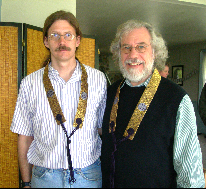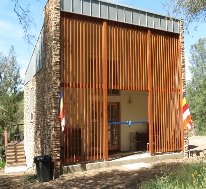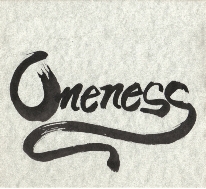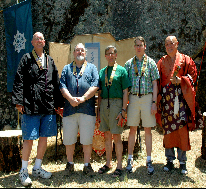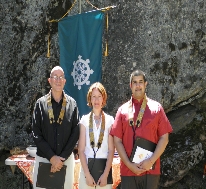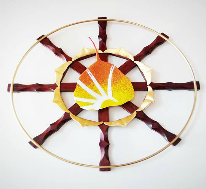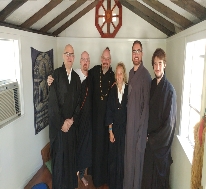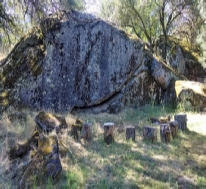LAY MINISTRY STUDY PROGRAM
Our Lay Ministry Program involves approximately 80 consecutive weeks of assigned readings, writing weekly reports and calling in to a weekly small discussion group with participants from around the country. Email access is required. Other than purchasing required text books, there are no tuition fees. Heavy sweat equity is required and a commitment to writing reports and participating in group sessions every Sunday evening.
A three-phase program is offered:
Phase One: Introduction to the Way of Oneness
Discussion over a four-month period that includes books
by Rev. Gyomay Kubose and Rev. Koyo Kubose.
Phase Two: Lay Ministry Courses
Topics covered over a fifteen-month period include life of the Buddha and basic teachings, Mahayana Buddhism, Buddhism in America, and relating the Dharma teachings to modern applications.
Phase Three: Practicum
Weekly small group tele-conference sessions will be held to discuss submitted written reports on assigned readings. Each session will last about 60-90 minutes. The start of the curriculum is the week after Labor Day in September and continues for about 20 months, ending in an Induction (graduation) Ceremony the week before Memorial Day in May.
The curriculum consists of coursework and practicum. The coursework has two parts. The first part is foundational and consists of readings on Gautama Buddha’s life, basic teachings, and the development of general Mahayana Buddhism. The second part of the coursework is Bright Dawn Center’s Way of Oneness approach as reflected in material written by Revs. Gyomay and son Koyo Kubose.
The coursework is followed by a weekly practicum period, which involves formulating and executing individual Action Plans (personal mindfulness exercises) around everyday activities. The goal is to develop a continually evolving daily practice and being able to see the Dharma teachings in all aspects of one’s life. Participants will work on roughly the same theme, submit a written report, and give feedback to each other in tele-conference calls.
Upon completion of the curriculum, all participants are expected to attend in person an Induction weekend at the Bright Dawn Center in Coarsegold (near Fresno, California). Induction weekend is usually held the weekend before Memorial Day in May. During the Induction weekend, a Saturday workshop is held on conducting religious services and an Induction Ceremony is held on Sunday.
Our focus is on everyday spirituality, rather than activities at a formal place of worship. Our focus on individual spirituality in everyday activities should not be considered to conflict or compete with an individual's existing religious tradition. We want to add something, not take anything away. We consider our approach to complement and enhance any traditional practices that an individual may be following. We see no need to promote sectarian exclusivity. A person could be a student or teacher in several traditions or approaches, perhaps integrating different aspects for optimal benefit.
Of course, our approach can stand on its own for those persons who have no need to integrate it with any existing practices. In such cases, there is nothing wrong with individual spirituality expanding into a formal Sangha with like-minded persons. In any case, it is not necessary to be judgmental and criticize other approaches in order to justify what one is doing. We want to be supportive and inclusive with regard to the "how" of making the teachings available. We recognize that what is "best" varies with time, place, and person.
A related second point about our Lay Program is that it explicitly endorses the concept of lay spiritual teachers. This differs from the usual situation of a sharp separation between lay and clergy, where the clergy delivers the teachings and conducts the religious rituals, and the congregation receives the teachings and is led in the rituals. Instead of this kind of sharply defined dichotomy between lay and clergy, our Lay Program proposes that lay persons be encouraged to provide religious teachings and practices rather than just be passive consumers or receivers.
Such encouragement can undoubtedly enhance an individual's spiritual growth. It is quoted, "If you really want to learn something, teach it." This is true because in order to teach and communicate something clearly to others, one's understanding has to be deeper and more comprehensive than when one is just the consumer of said teachings.
All ministers, when reflecting on their spiritual paths, would agree that a deep understanding of the teachings occurred through their ministry, rather than during their earlier years of studying. Although such prior study and training may have laid a necessary foundation, the most significant spiritual growth took place as ministers when expressing and sharing the teachings with others.
Anyone who is serious about his or her spiritual path, is encouraged to become a Lay Minister. The motivation to do this is important because it changes one's attitude toward the teachings. When one takes an active role of responsibility, the teachings are deeply internalised, often in creative ways that make the teachings uniquely one's own. It is by developing one's individual capabilities to the maximum that a contribution is made to society in general.
Interested persons can request more information about our Lay Ministry Program by contacting us via contact form.






